Our official English website, www.x-mol.net, welcomes your
feedback! (Note: you will need to create a separate account there.)
Interaction kinetics with transcriptomic and secretory responses of CD19-CAR natural killer-cell therapy in CD20 resistant non-hodgkin lymphoma.
Leukemia ( IF 12.8 ) Pub Date : 2019-11-26 , DOI: 10.1038/s41375-019-0663-x Dashnamoorthy Ravi 1 , Saheli Sarkar 2 , Sneha Purvey 3 , Frank Passero 4 , Afshin Beheshti 5 , Ying Chen 6 , Maisarah Mokhtar 1 , Kevin David 1 , Tania Konry 2 , Andrew M Evens 1
Leukemia ( IF 12.8 ) Pub Date : 2019-11-26 , DOI: 10.1038/s41375-019-0663-x Dashnamoorthy Ravi 1 , Saheli Sarkar 2 , Sneha Purvey 3 , Frank Passero 4 , Afshin Beheshti 5 , Ying Chen 6 , Maisarah Mokhtar 1 , Kevin David 1 , Tania Konry 2 , Andrew M Evens 1
Affiliation

|
We investigated the cytolytic and mechanistic activity of anti-CD19 chimeric antigen receptor natural killer (CD19.CAR.NK92) therapy in lymphoma cell lines (diffuse large B-cell, follicular, and Burkitt lymphoma), including rituximab- and obinutuzumab-resistant cells, patient-derived cells, and a human xenograft model. CD19.CAR.NK92 therapy significantly increased cytolytic activity at E:T ratios (1:1-10:1) via LDH release and prominent induction of apoptosis in all cell lines, including in anti-CD20 resistant lymphoma cells. The kinetics of CD19.CAR.NK92 cell death measured via droplet-based single cell microfluidics analysis showed that most lymphoma cells were killed by single contact, with anti-CD20 resistant cell lines requiring significantly longer contact duration with NK cells. In addition, systems biology transcriptomic analyses of flow-sorted lymphoma cells co-cultured with CD19.CAR.NK92 revealed conserved activation of IFNγ signaling, execution of apoptosis, ligand binding, and immunoregulatory and chemokine signaling pathways. Furthermore, a 92-plex cytokine panel analysis showed increased secretion of granzymes, increased secretion of FASL, CCL3, and IL10 in anti-CD20 resistant SUDHL4 cells with induction of genes relevant to mTOR and G2/M checkpoint activation, which were noted in all anti-CD20 resistant cells co-cultured with CD19.CAR.NK92 cells. Collectively, CD19.CAR.NK92 was associated with potent anti-lymphoma activity across a host of sensitive and resistant lymphoma cells that involved distinct immuno-biologic mechanisms of cell death.
中文翻译:

CD19耐药性非霍奇金淋巴瘤中CD19-CAR自然杀伤细胞治疗的转录组和分泌应答的相互作用动力学。
我们研究了抗CD19嵌合抗原受体天然杀伤剂(CD19.CAR.NK92)在淋巴瘤细胞系(弥散性大B细胞,滤泡性和Burkitt淋巴瘤),包括利妥昔单抗和奥比妥单抗耐药细胞中的溶细胞作用和机制活性。 ,患者来源的细胞和人类异种移植模型。CD19.CAR.NK92治疗通过LDH释放和在包括抗CD20耐药的淋巴瘤细胞在内的所有细胞系中显着诱导凋亡,以E:T比(1:1-10:1)显着提高了细胞溶解活性。通过基于液滴的单细胞微流控分析测量的CD19.CAR.NK92细胞死亡动力学表明,大多数淋巴瘤细胞被单次接触杀死,而抗CD20耐药细胞系需要与NK细胞的接触时间更长。此外,与CD19.CAR.NK92共培养的流分类淋巴瘤细胞的系统生物学转录组学分析显示,IFNγ信号传导的保守激活,凋亡的执行,配体结合以及免疫调节和趋化因子信号传导途径。此外,92重细胞因子面板分析显示抗CD20抗性SUDHL4细胞中颗粒酶的分泌增加,FASL,CCL3和IL10的分泌增加,并且诱导了与mTOR和G2 / M检查点激活相关的基因。与CD19.CAR.NK92细胞共培养的抗CD20耐药细胞。集体地,CD19.CAR.NK92与跨越许多敏感的和抗性的淋巴瘤细胞的有效抗淋巴瘤活性有关,这些细胞涉及不同的细胞死亡的免疫生物学机制。NK92揭示了IFNγ信号传导的保守激活,凋亡的执行,配体结合以及免疫调节和趋化因子信号传导途径。此外,92重细胞因子面板分析显示抗CD20抗性SUDHL4细胞中颗粒酶的分泌增加,FASL,CCL3和IL10的分泌增加,并且诱导了与mTOR和G2 / M检查点激活相关的基因。与CD19.CAR.NK92细胞共培养的抗CD20耐药细胞。集体地,CD19.CAR.NK92与跨越许多敏感的和抗性的淋巴瘤细胞的有效抗淋巴瘤活性有关,这些细胞涉及不同的细胞死亡的免疫生物学机制。NK92揭示了IFNγ信号传导的保守激活,凋亡的执行,配体结合以及免疫调节和趋化因子信号传导途径。此外,92重细胞因子面板分析显示抗CD20抗性SUDHL4细胞中颗粒酶的分泌增加,FASL,CCL3和IL10的分泌增加,并且诱导了与mTOR和G2 / M检查点激活相关的基因。与CD19.CAR.NK92细胞共培养的抗CD20耐药细胞。集体地,CD19.CAR.NK92与跨越许多敏感的和抗性的淋巴瘤细胞的有效抗淋巴瘤活性有关,这些细胞涉及不同的细胞死亡的免疫生物学机制。92重细胞因子面板分析显示,抗CD20耐药的SUDHL4细胞中颗粒酶的分泌增加,FASL,CCL3和IL10的分泌增加,并且诱导了与mTOR和G2 / M检查点激活相关的基因。与CD19.CAR.NK92细胞共培养的CD20抗性细胞。集体地,CD19.CAR.NK92与跨越许多敏感的和抗性的淋巴瘤细胞的有效抗淋巴瘤活性有关,这些细胞涉及不同的细胞死亡的免疫生物学机制。92重细胞因子面板分析显示,抗CD20耐药的SUDHL4细胞中颗粒酶的分泌增加,FASL,CCL3和IL10的分泌增加,并且诱导了与mTOR和G2 / M检查点激活相关的基因。与CD19.CAR.NK92细胞共培养的CD20抗性细胞。集体地,CD19.CAR.NK92与跨越许多敏感的和抗性的淋巴瘤细胞的有效抗淋巴瘤活性有关,这些细胞涉及不同的细胞死亡的免疫生物学机制。
更新日期:2019-11-27
中文翻译:

CD19耐药性非霍奇金淋巴瘤中CD19-CAR自然杀伤细胞治疗的转录组和分泌应答的相互作用动力学。
我们研究了抗CD19嵌合抗原受体天然杀伤剂(CD19.CAR.NK92)在淋巴瘤细胞系(弥散性大B细胞,滤泡性和Burkitt淋巴瘤),包括利妥昔单抗和奥比妥单抗耐药细胞中的溶细胞作用和机制活性。 ,患者来源的细胞和人类异种移植模型。CD19.CAR.NK92治疗通过LDH释放和在包括抗CD20耐药的淋巴瘤细胞在内的所有细胞系中显着诱导凋亡,以E:T比(1:1-10:1)显着提高了细胞溶解活性。通过基于液滴的单细胞微流控分析测量的CD19.CAR.NK92细胞死亡动力学表明,大多数淋巴瘤细胞被单次接触杀死,而抗CD20耐药细胞系需要与NK细胞的接触时间更长。此外,与CD19.CAR.NK92共培养的流分类淋巴瘤细胞的系统生物学转录组学分析显示,IFNγ信号传导的保守激活,凋亡的执行,配体结合以及免疫调节和趋化因子信号传导途径。此外,92重细胞因子面板分析显示抗CD20抗性SUDHL4细胞中颗粒酶的分泌增加,FASL,CCL3和IL10的分泌增加,并且诱导了与mTOR和G2 / M检查点激活相关的基因。与CD19.CAR.NK92细胞共培养的抗CD20耐药细胞。集体地,CD19.CAR.NK92与跨越许多敏感的和抗性的淋巴瘤细胞的有效抗淋巴瘤活性有关,这些细胞涉及不同的细胞死亡的免疫生物学机制。NK92揭示了IFNγ信号传导的保守激活,凋亡的执行,配体结合以及免疫调节和趋化因子信号传导途径。此外,92重细胞因子面板分析显示抗CD20抗性SUDHL4细胞中颗粒酶的分泌增加,FASL,CCL3和IL10的分泌增加,并且诱导了与mTOR和G2 / M检查点激活相关的基因。与CD19.CAR.NK92细胞共培养的抗CD20耐药细胞。集体地,CD19.CAR.NK92与跨越许多敏感的和抗性的淋巴瘤细胞的有效抗淋巴瘤活性有关,这些细胞涉及不同的细胞死亡的免疫生物学机制。NK92揭示了IFNγ信号传导的保守激活,凋亡的执行,配体结合以及免疫调节和趋化因子信号传导途径。此外,92重细胞因子面板分析显示抗CD20抗性SUDHL4细胞中颗粒酶的分泌增加,FASL,CCL3和IL10的分泌增加,并且诱导了与mTOR和G2 / M检查点激活相关的基因。与CD19.CAR.NK92细胞共培养的抗CD20耐药细胞。集体地,CD19.CAR.NK92与跨越许多敏感的和抗性的淋巴瘤细胞的有效抗淋巴瘤活性有关,这些细胞涉及不同的细胞死亡的免疫生物学机制。92重细胞因子面板分析显示,抗CD20耐药的SUDHL4细胞中颗粒酶的分泌增加,FASL,CCL3和IL10的分泌增加,并且诱导了与mTOR和G2 / M检查点激活相关的基因。与CD19.CAR.NK92细胞共培养的CD20抗性细胞。集体地,CD19.CAR.NK92与跨越许多敏感的和抗性的淋巴瘤细胞的有效抗淋巴瘤活性有关,这些细胞涉及不同的细胞死亡的免疫生物学机制。92重细胞因子面板分析显示,抗CD20耐药的SUDHL4细胞中颗粒酶的分泌增加,FASL,CCL3和IL10的分泌增加,并且诱导了与mTOR和G2 / M检查点激活相关的基因。与CD19.CAR.NK92细胞共培养的CD20抗性细胞。集体地,CD19.CAR.NK92与跨越许多敏感的和抗性的淋巴瘤细胞的有效抗淋巴瘤活性有关,这些细胞涉及不同的细胞死亡的免疫生物学机制。











































 京公网安备 11010802027423号
京公网安备 11010802027423号